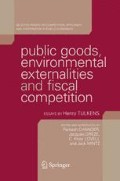Abstract
The CLIMNEG world simulation (CWS) model is introduced here for simulating cooperative game theoretic aspects of global climate negotiations. The CWS model is derived from the seminal RICE model by Nordhaus and Yang [Am. Econ. Rev. 86 (1996) 741]. We first state the necessary conditions that determine Pareto efficient investment and emission abatement paths under alternative regimes of cooperation between the regions. We then show with a numerical version of the CWS model that the transfer scheme advocated by Germain, Toint and Tulkens (1997) induces an allocation in the (“gamma”) core of the world carbon emission abatement cooperative game.
Access this chapter
Tax calculation will be finalised at checkout
Purchases are for personal use only
Preview
Unable to display preview. Download preview PDF.
References
Barrett, S., 1994. Self-enforcing international environmental agreements, Oxford Economic Papers, 46, 878–894.
Carraro, C. and Siniscalco, D., 1993. Strategies for the international protection of the environment, Journal of Public Economics, 52, 309–328.
Chander, P. and Tulkens, H., 1995. A core-theoretic solution for the design of cooperative agreements on transfrontier pollution, International Tax and Public Finance, 2, 279–293. (Chapter 9 in this volume).
Chander, P. and Tulkens, H., 1997. The core of an economy with multilateral environmental externalities, International Journal of Game Theory, 26, 379–401. (Chapter 8 in this volume).
Chander, P., Tulkens, H., van Ypersele, J.-P. and Willems, S., 2002. The Kyoto Protocol, an economic and game theoretic interpretation, in P. Dasgupta, B. Kriström, and K.G. Löfgren, (eds.). Environmental economics: theoretical and empirical inquiries, Festschrift in honour of Karl-Göran Mäler. Cheltenham: Edward Elgar, chapter 6, 98–117. (Chapter 10 in this volume).
Chwe, M.S.-Y., 1994. Farsighted coalitional stability, Journal of Economic Theory, 63, 299–325.
Eyckmans, J., 1997. Nash implementation of a proportional solution to international pollution control problems, Journal of Environmental Economics and Management, 33, 314–330.
Eyckmans, J., 2001. On the farsighted stability of the Kyoto Protocol. ETE Working Paper 2001-03, K.U. Leuven-CES-ETE and CLIMNEG Working Paper 40. Louvain-la-Neuve: Université catholique de Louvain.
Eyckmans, J. and Bertrand, C., 2000. Integrated assessment of carbon and sulphur emissions, simulations with the CLIMNEG model. CLIMNEG Working Paper 32. Louvainla-Neuve: Université catholique de Louvain.
Eyckmans, J. and Finus, M., (forthcoming 2006). Coalition formation in a global warming game: how the design of protocols affects the success of environmental treaty-making, Natural Resource Modeling.
Eyckmans, J., Proost, S. and Schokkaert, E., 1993. Equity and efficiency in greenhouse negotiations, Kyklos, 46, 363–397.
Germain, M., Toint, Ph. and Tulkens, H., 1998. Financial transfers to sustain cooperative international optimality in stock pollutant abatement, in F. Duchin, S. Faucheux, J. Gowdy and I. Nicolaï (eds.). Sustainability and firms: technological change and the changing regulatory environment. Cheltenham: Edward Elgar, 205–219.
Germain, M., Toint, Ph.L., Tulkens, H. and De Zeeuw, A., 2003. Ttransfers to sustain dynamic core-theoretic cooperation in international stock pollutant control, Journal of Economic Dynamics and Control, 28, 79–99. (Chapter 12 in this volume).
Hackl, F. and Pruckner, G.J., 2002. How global is the solution to global warming? Economic Modelling, 20, 93–117.
Hoel, M., 1992. International environmental conventions: the case of uniform reductions of emissions, Environmental and Resource Economics, 2, 141–159.
Kaitala, V., Pohjola, M. and Tahvonen, O., 1992. Transboundary air pollution and soil acidification: a dynamic analysis of an acid rain game between Finland and the USSR, Environmental and Resource Economics, 2, 161–181.
Mäler, K.-G., 1989. The acid rain game, in H. Folmer and E. Van Ierland (eds.), Valuation methods and policy making in environmental economics. Amsterdam: Elsevier, 231–252.
Nordhaus, W.D. and Yang, Z., 1996. A regional dynamic general-equilibrium model of alternative climate change strategies, American Economic Review, 86, 741–765.
Samuelson, P.A., 1954. The pure theory of public expenditure, Review of Economics and Statistics, 36, 387–389.
Tulkens, H., 1979. An economic model of international negotiations relating to transfrontier pollution, in K. Krippendorff (ed.). Communication and control in society. New York: Gordon and Breach, 199–212. (Chapter 5 in this volume).
Tulkens, H., 1998. Cooperation versus free-riding in international environmental affairs: two approaches, in N. Hanley and H. Folmer (eds.). Game theory and the environment. Cheltenham: Edward Elgar, 30–44.
van der Ploeg, F. and de Zeeuw, A.J., 1992. International aspects of pollution control, Environmental and Resource Economics, 2, 117–139.
Yang, Z., 1998. Incentive compatible coalitions in international agreements on CO 2 emission controls, mimeo, MIT.
Author information
Authors and Affiliations
Editor information
Editors and Affiliations
Rights and permissions
Copyright information
© 2006 Springer Science+Business Media, LLC
About this chapter
Cite this chapter
Eyckmans, J., Tulkens, H. (2006). Simulating Coalitionally Stable Burden Sharing Agreements for the Climate Change Problem. In: Chander, P., Drèze, J., Lovell, C.K., Mintz, J. (eds) Public goods, environmental externalities and fiscal competition. Springer, Boston, MA. https://doi.org/10.1007/978-0-387-25534-7_13
Download citation
DOI: https://doi.org/10.1007/978-0-387-25534-7_13
Publisher Name: Springer, Boston, MA
Print ISBN: 978-0-387-25533-0
Online ISBN: 978-0-387-25534-7
eBook Packages: Business and EconomicsEconomics and Finance (R0)

